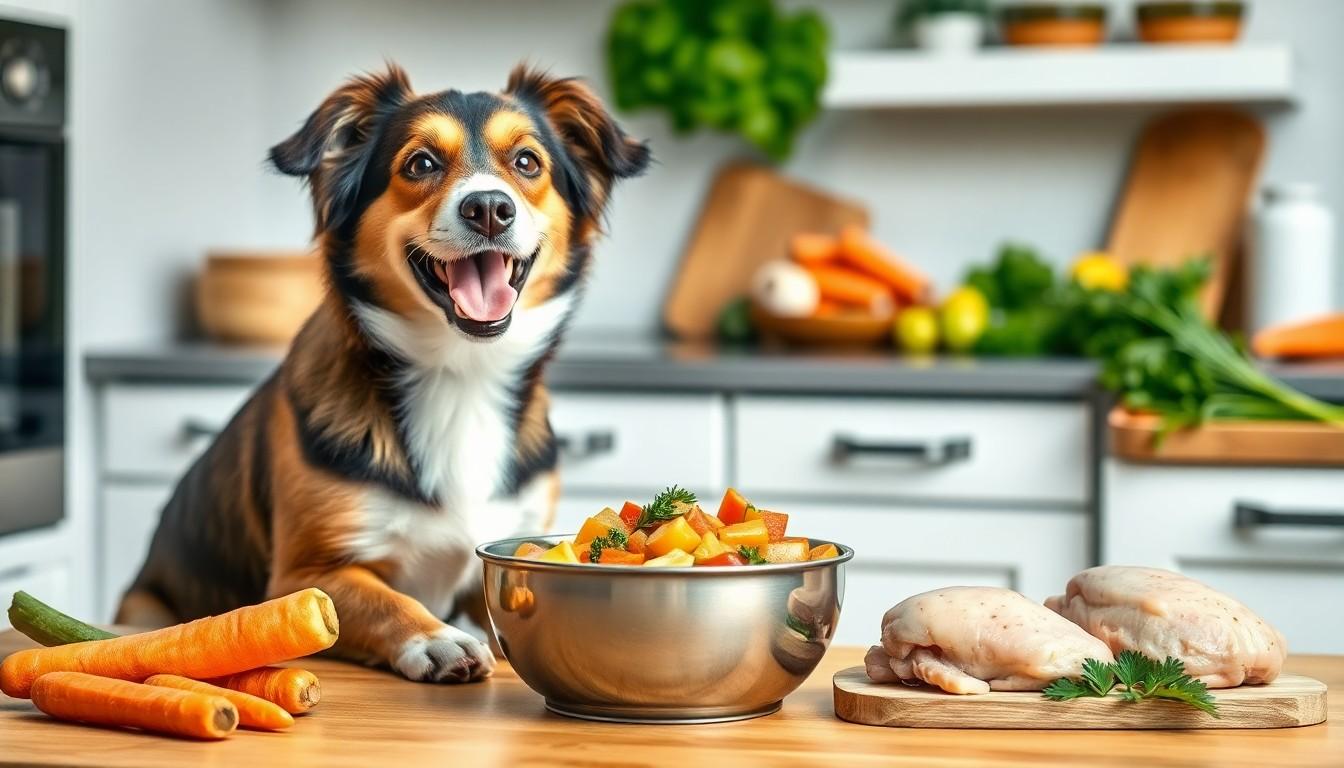Homemade Food for Dogs to Gain Weight: Easy Recipes and Expert Tips

When it comes to our furry friends, a healthy weight is crucial, but not all dogs are blessed with a hearty appetite. If your pup’s looking a little too lean and needs a weight boost, homemade meals might just be the secret ingredient to their success. Forget the store-bought kibble that could double as a doorstop; it’s time to whip up some tail-wagging dishes that’ll have them licking their bowls clean and begging for seconds.
Homemade Food for Dogs to Gain Weight
Understanding canine nutrition is essential for promoting healthy weight gain in dogs. A balanced diet supports their overall well-being, particularly for those with diminished appetites.
Importance of Balanced Diet
A balanced diet provides the necessary vitamins and minerals for optimal canine health. Essential nutrients help maintain energy levels and promote healthy growth. Dogs require a mix of carbohydrates, proteins, and fats to thrive. Nutrient-rich foods can facilitate weight gain by providing more calories. Homemade meals often include wholesome ingredients, like vegetables and grains, which support digestive health. Tailoring meals to a dog’s specific needs ensures they receive adequate nutrition without excess fillers.
Role of Protein and Fat
Protein plays a crucial role in muscle development and repair. High-quality protein sources, such as chicken and fish, enhance muscle mass, which contributes to healthy weight gain. Fat is another significant component, delivering concentrated energy. Healthy sources of fat, like fish oil and flaxseed oil, improve coat health and boost calories in meals. Both protein and fat should be included in every homemade dish to ensure effectiveness in weight gain. Consistent incorporation of these nutrients fosters an environment where dogs can put on weight naturally and healthily.
Benefits of Homemade Food for Dogs

Homemade food offers multiple advantages for dogs aiming to gain weight. Pet owners can control the quality and nutritional value of every ingredient used in their dog’s meals.
Healthier Ingredients
Healthier ingredients play a significant role in homemade dog food. Fresh produce, whole grains, and high-quality proteins provide essential nutrients. These whole foods can improve digestive health and boost immune function. For instance, chicken, beef, and fish supply proteins that support muscle development. Carrots and spinach contain vitamins and minerals that enhance overall health. Healthy fats, such as flaxseed oil or coconut oil, provide additional calories while promoting a shiny coat. Ensuring these ingredients offers a considerable benefit compared to processed kibble.
Customization for Individual Needs
Customization for individual needs allows pet owners to tailor meals for their dog’s specific requirements. A dog’s age, activity level, and health condition can influence dietary needs. For instance, an active dog may require more calories than a less active dog. Homemade meals can easily adjust portions and ingredients to meet these varying needs. A gluten-free option is available for dogs with allergies or sensitivities. Additionally, incorporating personal preferences may encourage picky eaters to consume more food. Customization ensures each dog receives the nutrients necessary for healthy weight gain.
Best Ingredients for Weight Gain
Choosing the right ingredients is essential for helping dogs gain weight healthily. Focusing on nutrient-dense options promotes overall well-being.
Protein Sources
High-quality protein sources play a crucial role in muscle development. Chicken, beef, and fish provide essential amino acids. Eggs also serve as an excellent protein source, offering versatility in meals. Cottage cheese and Greek yogurt can further boost protein content. Including these ingredients in homemade meals helps support weight gain effectively.
Healthy Fats
Healthy fats are vital for increasing calorie intake. Ingredients like olive oil and coconut oil add healthy fats and enhance flavor. Fish oil provides omega-3 fatty acids, promoting coat health as well. Peanut butter can also be a tasty option, enticing dogs to eat more. Incorporating these fats ensures a balanced approach to weight gain in dogs.
Carbohydrates and Fiber
Carbohydrates offer a significant energy source for active dogs. Oats, brown rice, and sweet potatoes are excellent carbohydrate choices. These ingredients not only provide energy but also contribute to digestive health. Including pumpkin or green beans adds fiber, promoting healthy digestion. Focusing on these options ensures dogs receive essential nutrients while gaining weight.
Homemade Recipes for Weight Gain
Homemade recipes provide delicious options that help dogs gain weight while ensuring they receive the necessary nutrients.
Recipe 1: High-Protein Chicken Mix
This recipe combines lean chicken breast, brown rice, and carrots. Start by cooking the chicken until fully done, then shred it into small pieces. Combine the shredded chicken with cooked brown rice and finely chopped carrots. Cook the mixture until the carrots soften, ensuring a nutritious and easy-to-digest meal. This dish supplies protein and healthy carbohydrates that promote muscle growth and energy.
Recipe 2: Beef and Sweet Potato Delight
For this hearty meal, use ground beef paired with sweet potatoes and peas. Brown the ground beef in a skillet, draining excess fat for a healthier option. Next, cook finely diced sweet potatoes until tender and mix them with the beef. Stir in cooked peas for additional vitamins and minerals, creating a wholesome food that supports weight gain. The combination of protein and complex carbohydrates in this recipe fuels dogs effectively.
Recipe 3: Fish and Rice Broth
This flavorful recipe features fish, white rice, and spinach. Choose a dog-safe fish like salmon or tuna, cooking it thoroughly and flaking it apart. Cook white rice in fish broth for enhanced flavor, then mix in the fish and lightly steamed spinach. This meal not only entices dogs with its taste but also provides essential omega-3 fatty acids and nutrients that contribute to healthy weight gain.

Tips for Transitioning to Homemade Food
Transitioning a dog to homemade food requires careful planning and monitoring. A gradual approach helps prevent digestive issues and eases the change.
Gradual Introduction
Start by mixing a small amount of homemade food with the current diet. Over the course of about seven to ten days, increase the proportion of homemade meals. This gradual introduction allows for adjustment to new flavors and textures. Monitor for any signs of upset stomach or allergic reactions during this period. Adjust portions based on your dog’s response to the new food. They may begin eating more eagerly as they adapt to homemade options.
Monitoring Weight and Health
Monitor weight and health closely during the transition. Regular weigh-ins help assess whether the homemade diet supports weight gain. Note any changes in energy levels, coat condition, or overall behavior. These indicators provide insight into how well the new diet meets nutritional needs. If weight gain stalls or health issues arise, consult a veterinarian. Adjustments may be necessary to ensure the diet includes adequate protein, fats, and carbohydrates. A balanced homemade diet should promote a healthy weight gain process and overall well-being.



